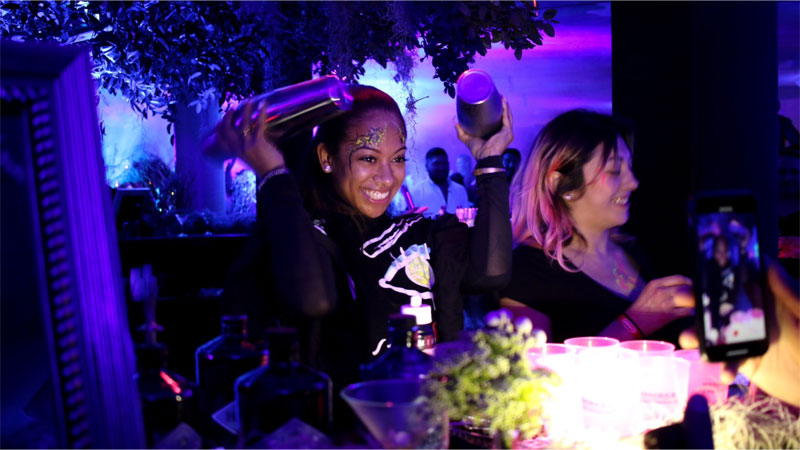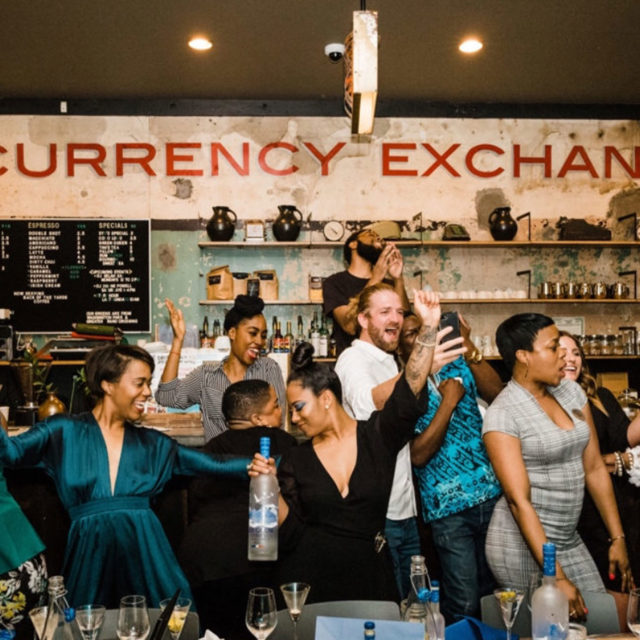Walk into any bar worth its bitters and you’ll probably see a variation on this theme: a fleet of white, hipster-style bartenders (extra points for ostentatious mustaches or beards) shaking and stirring bespoke cocktails in dimly lit, performative spaces. Black and brown faces are glaringly absent.
Alexis Brown and Ariel Neil, two bar professionals in Chicago, noticed these inequities and decided to act. They founded Causing a Stir in 2016 to address the lack of inclusion and career advancement in underrepresented communities in their home turf, Chicago’s Southside. (Earlier this year, Neil left the company. Brown declined to comment on the reasons for her departure.)
Brown and Neil met a few years ago while they were coming up in the bartending world, trying to make their names in Chicago’s bar scene. Both are women of color, and they quickly realized they had a lot in common.
Time after time, when Brown walked into spaces meant to serve as education opportunities for rising talent in Chicago’s bar scene, she found herself one of only a few faces of color in an otherwise seemingly endless sea of bearded white men.
She was determined to advance her career, but the learning curve in those rooms was steep. “I felt intimidated because the people who are teaching these classes spoke in terms that I wasn’t familiar with,” Brown remembers. “I had to research things on my own so I could get a better understanding.”

For Brown, this experience hammered something home: Black and brown bartenders don’t have access to the same educational, employment, or mentorship opportunities as their white counterparts. “I saw all of these people at Tales of the Cocktail winning awards getting ‘flewed out’ all over the world and I was like, ‘dang, I can do this. I want to do this,’” she says.
She co-founded Creating a Stir to provide future bartenders with resources, mentorship, and opportunities.
“I come from an underserved community and I’m an underrepresented individual, and I wanted to create what I didn’t have,” Brown says.
When Brown was ready to join the workforce and hone her craft, she recalls, very few bars were willing to give her a shot.
“I went to bartending school like everybody thinks they’re supposed to,” she says. “The first place that I went to was The Wit. It was a crazy atmosphere, and I was like, ‘dang, I want to work here.’ I got an interview, took my resume and [the bar manager] told me, ‘you don’t have enough experience.’”
The people willing to hire her were the bars and lounges in the Southside where she grew up. Here, she mostly served patrons whose faces reflected her own.
“When you see the people that get the better [job] opportunities, they are downtown or on the North Side,” Brown says about the most lucrative bartending employment prospects. “Now that I’ve been in those spaces of power and created relationships with those individuals, I want to take those resources and put them in the communities that need them the most. I want to connect people to opportunity.”

The absence of people of color in the upper echelons of bartending smacks of historical erasure. Historically, for many enslaved African Americans, service industry jobs were one of the few reliable pathways to economic independence.
“Hospitality jobs were the first jobs that people could buy their freedom from,” Brown says. “The Pullman Porters were the first union jobs where [black people] came together as a collective and forced these unions to give them benefits for the work that they were doing, and they were able to make a living.”
For Brown, Causing A Stir is as much about creating equity as it is inspiring pride in the complicated histories that black Americans have with the service industry. One of the first articles she read about the history of black bartenders focused on names lost to the larger bartending history, such as Cato Alexander and John Bullock. These weren’t names Brown was taught about during her deep immersion in the bartending world.
“I had to search for it. I had to go to the Library of Congress to pull records and pull articles and newspaper clippings to really put myself back in that time,” Brown says. “So, now whenever I have an opportunity to talk about it, I do. … I’ve made it a part of the [Causing a Stir] curriculum, and I’m trying now to train and empower other people to to be more inclusive of that information.”
So much of inclusivity is allowing space for hard conversations and uneasy truths. Brown believes that the current system benefits white mixologists and bar programs mainly because hard conversations are avoided. She hopes Causing a Stir will help move those conversations forward, whether the powers that be want it or not.
“It had to be a person of color to start this or be the face of this or evoke this because it [requires] a lot of passion behind it,” Brown says. “White bartenders and white companies are largely ignorant. They don’t know, and they don’t know what they don’t know.”
Thankfully, signs of change are stirring on the horizon. Inclusivity advocates like Ashtin Berry, Krystal Mack, and organizations like Equity At the Table are making noise. The hospitality industry is starting to take note.
“It’s called food and beverage,” says a bemused Brown. “I mean, at the end of the day, it covers any and everyone, so you have to make everyone feel welcome. You cannot be a restaurant, can’t be a bar, you can’t be a place of service and not think about the bigger picture of who you’re servicing.”
